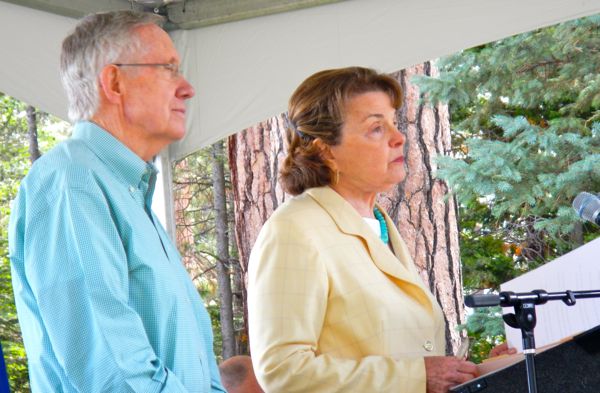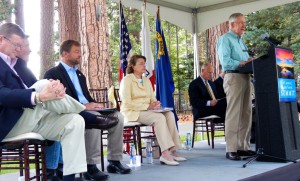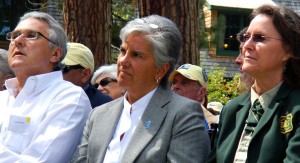Wildfire threat dominates enviro summit talks

Sens. Harry Reid and Dianne Feinstein have been proponents of Lake Tahoe for years. Photos/Kathryn reed
By Kathryn Reed
CAMP RICHARDSON – Now in its 18th year, the Lake Tahoe Environmental Summit is the place for politicians and others to tout how much they care about the basin, what they’ve done to make it great and what they want to do for the future.
Since the first summit, $1.74 billion has been invested through what’s called the environmental improvement program. Much of that is taxpayer money, with $323.7 million from the private sector. Those private dollars continue to grow as government at all levels has less to dole out.
But if the Lake Tahoe Restoration Act is reauthorized, it calls for $415 million from the feds. Rep. Mark Amodei, R-Carson City, is the sponsor of the bill.
Sen. Dianne Feinstein, D-Calif, who hosted the event at Valhalla, said the entire investment is working. At the first summit a white dinner plate-like device could be seen to a depth of 64 feet, while today the naked eye can view it at 75 feet. She rattled off the number of road miles that have been improved, acres of forest treated for fuels reduction and wildlife habitat restoration, and the commitment to preventing more invasive species from taking hold in Lake Tahoe.

Sen. Harry Reid speaks Aug. 19 at the annual environmental summit. Also on stage are Rep. Mark Amodei, Rep. John Garamendi, Sen. Dean Heller, Sen. Dianne Feinstein, Gov. Jerry Brown, Gov. Brian Sandoval, Rep. Tom McClintock, and Lt. Gov. Gavin Newsom.
The theme of the Aug. 19 event was Drought, Wildfire and Invasive Species: Confronting the Effects of Climate Change on Lake Tahoe. More than 300 people attended the event.
Wildfire dominated the talks, especially with the lawmakers signing a proclamation updating the multi-agency fuel reduction program that is led by the Lake Tahoe Fuels and Fire Team.
“This is important because fire is going to be with us and more so in the future,” Fire Chief Mike Brown with North Lake Tahoe Fire Department said.
It is designed to be a strategy to protect life and property in the basin. Fire chiefs from throughout the basin were in attendance – as they have been most years.
Fire has been a constant topic ever since the 2007 Angora Fire reduced 254 houses to ash. Many of those homes on the outskirts of South Lake Tahoe have since been rebuilt and the forest has new growth, but so many burned trees remain as a visual reminder of what happened that June.
While most of the electeds talked nice and about how well the California and Nevada delegations get along, it was Rep. Tom McClintock, R-Granite Bay, who had some of the most impassioned words of the day. He is an outspoken critic of the U.S. Forest Service and environmentalists, especially when it comes to harvesting timber after a fire. He singled out how the wood from last year’s Rim Fire is just standing there.
“Excess marketable timber should be sold and removed from the forests, with the proceeds used to provide for forest restoration and the reduction of ladder fuels,” the congressman who represents the California side of Lake Tahoe said. “The sale of excess timber and the use of biomass generation can substantially supplement the cost of fuels reduction, making the proper management of our forests cost-effective once again.
“The escalating costs of fighting fires should be treated as other natural disasters and not funded by shorting fuel reduction budgets.”
Nevada Gov. Brian Sandoval spoke of having recently hiked to Snow Valley Peak and being able to see the impact of drought in the high country. That lack of moisture ties into growing concerns that fire is a real threat to the area.
Geoff Schladow, executive director of Tahoe Environmental Research Center, also pointed out how wildfires inside and outside the basin impact air and water quality here.
Schladow said having data going back to the early 1960s has allowed scientists to understand how Tahoe has changed, and he added research needs to continue. But that takes money.
California Gov. Jerry Brown said, “The success to date give us a lot of encouragement. At the end of the day, nature rules.”
